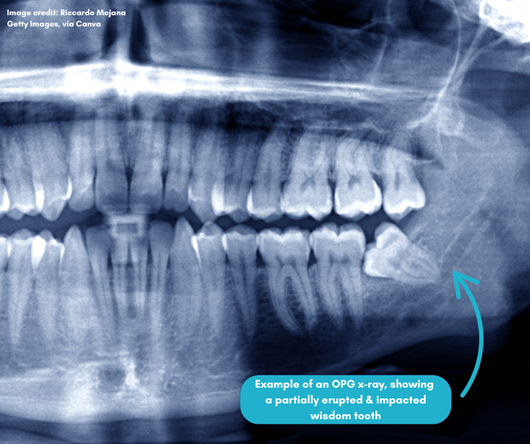Wisdom tooth pain is one of the most common dental issues that we treat regularly; wisdom teeth don’t always cause issues for those who have them, but when they do it can cause major pain and disruption to everyday life.
Here is our guide discussing all things wisdom teeth; from why we even have them, to why they can cause so much trouble!
What exactly are wisdom teeth?
Adults typically have 32 teeth; 28 of these adult teeth will most likely have erupted by the time a person is around 12-14 years old, when the second molars (the back teeth) are finished coming through the gum.
Sometimes, another set of molars (known as the third molars) erupt after this; usually between the ages of 17-25 years old, although they can erupt even later than this. These third molars are also known as wisdom teeth- the name stemming from the fact that they typically erupt at a more “mature” adult age, rather than during childhood like the rest of the teeth.
Despite the name, their eruption does not mean that we are getting any wiser unfortunately! ☹
What do our wisdom teeth actually do?
Scientists believe that wisdom teeth were important to our ancestors, who had a much larger jaw structure than us, and would have needed a third set of molars to break down tougher meat in their diets.
Of course, our diet has changed drastically since then; modern humans now have less of a need for these extra molars. In fact, early research shows that fewer people are developing wisdom teeth, and some scientists predict that eventually humans will evolve to stop developing wisdom teeth altogether!
Provided all the other molars are present, the wisdom teeth provide little benefit to us once erupted. What’s more, our smaller jaws now mean that most people have little room left behind their second molars for the third molars to erupt, which is why wisdom teeth can cause so much bother as they attempt to push their way out of the gum- this can lead to an “impacted” wisdom tooth.
What does an “impacted” wisdom tooth mean?
Simply put, an impacted wisdom tooth refers to a third molar that is stuck in the gum or jaw.
Sometimes when a wisdom tooth is trying to erupt from the gum, it gets stuck behind the second molar in front of it due to lack of space- when this happens, it can stay underneath the gum (impacted), or fail to come through the gum fully (partially erupted). A wisdom tooth can also become impacted if it tries to erupt at a difficult angle and not straight like the other teeth, e.g. a horizontally impacted wisdom tooth.
Just because a wisdom tooth erupts, either partially or fully, does not mean that it will cause any issues. For most people, one or more of their wisdom teeth will erupt and they will experience no problems, other than slight discomfort while the tooth breaks through the gum. Some people might even have wisdom teeth that while developed, never erupt and stay underneath the gum despite not being impacted.

Even if a wisdom tooth is impacted, this does not always mean that it will cause pain. Whether a wisdom tooth will cause issue or not can be dependant on many different factors, and some are not as lucky as others when it comes to wisdom tooth eruption.
Why do wisdom teeth get infected?
When a wisdom tooth is impacted or has partially erupted, this can make the tooth difficult to clean and cause a build-up of debris and bacteria to build up around the area, especially if the tooth is still partially covered by a small flap of the gum which traps food easily. This build-up can cause inflammation and infection in the gum surrounding the wisdom tooth, also known as pericoronitis.
Wisdom teeth that have trapped debris can also become decayed (and cause caries in the adjacent teeth), cause pain when chewing, bad breath, and a dental abscess due to infection.
What should I do if I think my wisdom tooth is infected?
Some people may have a wisdom tooth infection just once has the tooth erupts, however sometimes people will get recurring wisdom tooth infections, and will continue to do so until the tooth is removed.
If you experience pain, inflammation or swelling around the wisdom tooth it is always recommended to get it assessed by a dentist as soon as possible. The dentist will provide advice on how best to manage the symptoms, which will usually include warm salty water rinses to keep the area clean, possible antibiotics to clear the infection, and whatever pain relief you normally take until the symptoms have subsided.
During consultation for a wisdom tooth issue, the dentist will normally take an OPG (full mouth) x-ray. At Renmore Dental, we are one of the few dentists in Galway that have an on-site OPG/CBCT imaging machine, so we can take this x-ray here for you during your appointment.
An OPG x-ray is very useful for the treatment of wisdom teeth, is it shows the position of the tooth within the gum/jaw, whether it is impacted, and how close it is to the nearby nerves.
Can I get my wisdom tooth extracted?
Your dentist will only recommend having one or more wisdom teeth extracted if there is a valid clinical reason for doing so, such as pain, recurring infections, or decay.
At Renmore Dental, we do provide wisdom tooth extractions; however this depends on your OPG x-rays results. If the position of the tooth allows, routine extractions of wisdom teeth can be done here at the practice. It is a quick procedure that is done all under local anaesthetic.
Why am I being referred to have my wisdom tooth extracted?
In the event that a wisdom tooth is too difficult to extract in a general dental setting, e.g. impacted, very close to nerves, etc. then we may refer you to a specialist oral surgeon to have one or more wisdom teeth extracted together. This may be done under local or general anaesthetic depending on the patient’s specific treatment needs, and is carried out in a specialist clinic or hospital setting.
This is why a consultation is always essential before wisdom tooth extraction, in order to determine the difficulty of the extraction and the best option for each individual patient.
How do I organise a wisdom tooth consultation?
To organise a consultation to discuss wisdom tooth issues, we recommend calling the practice on 091 757 678 and our patient care team will set up a dedicated consultation appointment to discuss your specific dental needs.
If you still have questions about wisdom teeth, contact our patient care team and they will be happy to help!
Contact us on 091 757 678 or email info@renmoredental.ie to enquire.
